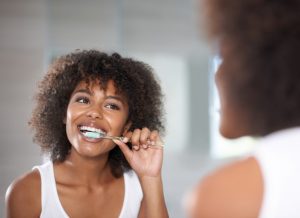 Tooth brushing is one of the most important ways patients prevent unnecessary decay or damage. Brushing technique has a huge impact on the effectiveness of daily oral hygiene, and our dentist and hygiene team will be happy to demonstrate proper brushing techniques during any dental checkup, but one of the questions we hear most often from patients is, “What type of toothbrush should I be using?” Many times patients want to know whether or not they should invest in a mechanical toothbrush rather than the traditional manual brush. We tell patients that any toothbrush used properly will remove plaque and tartar buildup, but we can make some specific suggestions based on your unique oral health condition. At Carlisle Family & Cosmetic Dentistry, our team is here to help dental patients from Boiling Springs and other surrounding communities make the best oral health and hygiene choices in our office and at home. Contact us to schedule your dental checkup to find out more.
Tooth brushing is one of the most important ways patients prevent unnecessary decay or damage. Brushing technique has a huge impact on the effectiveness of daily oral hygiene, and our dentist and hygiene team will be happy to demonstrate proper brushing techniques during any dental checkup, but one of the questions we hear most often from patients is, “What type of toothbrush should I be using?” Many times patients want to know whether or not they should invest in a mechanical toothbrush rather than the traditional manual brush. We tell patients that any toothbrush used properly will remove plaque and tartar buildup, but we can make some specific suggestions based on your unique oral health condition. At Carlisle Family & Cosmetic Dentistry, our team is here to help dental patients from Boiling Springs and other surrounding communities make the best oral health and hygiene choices in our office and at home. Contact us to schedule your dental checkup to find out more.
Types of Toothbrushes
There are two main types of toothbrush – manual and electric. Manual toothbrushes are available in a wide variety of styles, but the key to choosing a good manual brush is to select one that has soft bristles. Many patients think that hard bristles will remove more plaque, but this is likely untrue. Instead, hard bristled brushes remove the same amount of plaque, but they may damage soft tissue. When choosing an electric toothbrush, it’s important to keep the same qualities in mind. Replacement toothbrush heads should be soft bristled. Otherwise, electric toothbrushes can also be effective when properly used.
Oral Health and Toothbrush Choice
There are several unique oral health conditions that may impact which type of toothbrush you purchase. This includes the following:
- Sensitive teeth – patients with sensitive teeth need to use an ultra-soft bristled brush to avoid further irritating the sensitive dental structures. Electric toothbrushes are typically not ideal for patients with sensitive teeth. However, as long as patients use the brush gently, they should be able to use any kind of toothbrush.
- Gum disease – there are several toothbrush manufacturers who have created toothbrushes specifically geared toward gum disease sufferers. Some of these brushes claim they clean better below the gums or between teeth. Again, the most important aspect of toothbrush selection is the softness of the bristles to avoid additional damage to the already sensitive soft tissue.
- Dentures – like natural teeth, dental prosthetics need to be brushed each day. Because the ceramics and other materials used to craft dentures are not as strong as tooth enamel, we encourage patients to purchase minimally abrasive toothpastes and toothbrushes specifically made for dentures. This will protect your denture and ensure it remains intact for years to come.
- Kids – children’s toothbrushes are made with smaller heads that make it easier for our young patients to access and clean all of their teeth without discomfort.
- Babies – infants’ teeth need to be brushed each day from the time the first tooth erupts from the gum line. There are specially crafted brushes that are easy to hold while brushing your baby’s teeth. If you need help with this, please don’t hesitate to ask for help. We’ll be happy to walk you through the best techniques at your general and preventive dentistry
